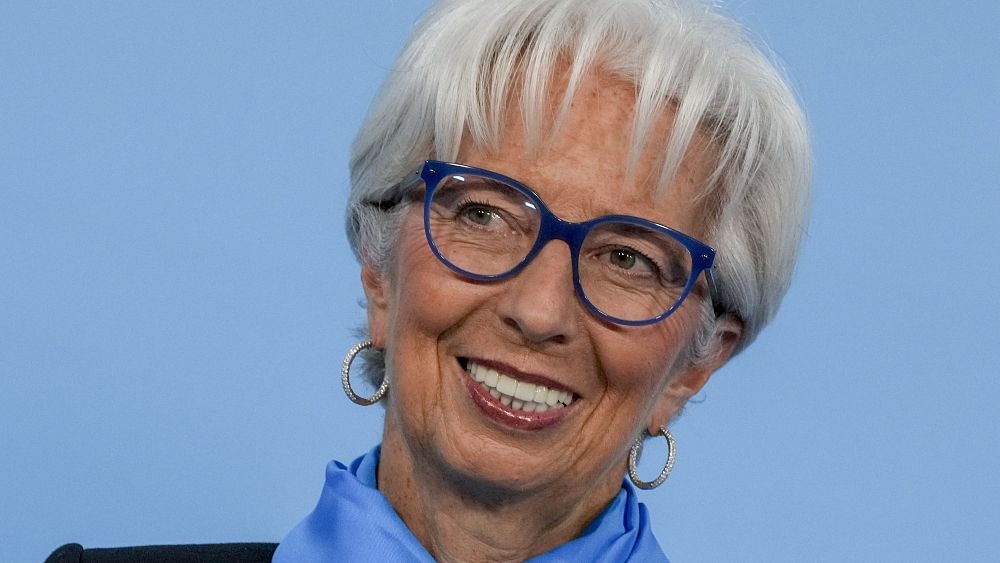
The European Central Bank is being pulled two ways: It’s caught between a scheduled end of its pandemic stimulus and growing alarm about the new omicron variant of the coronavirus even as other central banks around the world decide to take steps to combat soaring consumer prices.
The dilemma faced by the bank and President Christine Lagarde at their meeting on Thursday in Frankfurt is compounded by a wave of infections caused by the earlier delta variant. On top of that, persistent shortages of parts and raw materials also are contributing to a late-year slowdown of the recovery in the 19 European Union countries that use the euro.
Many questions are unanswered about the fast-spreading omicron variant, including whether it can evade vaccines and the likelihood of severe illness. That makes the outcome of Thursday’s European Central Bank meeting harder to predict than usual, analysts say.
“Rarely has the backdrop for a major ECB decision been as uncomfortable and as uncertain as it is now,” analysts at Berenberg bank said.
With the eurozone economy within 0.3% of its pre-pandemic level and inflation at a record high of 4.9%, there are factors pushing “in favour of reducing the monetary stimulus significantly and fast,” the Berenberg analysts said. “However, the recent surge in infections in core Europe and the rapid spread of the omicron variant … are casting a dark shadow over the near-term outlook for the eurozone.”
Analysts say the bank’s governing council will probably confirm that a 1.85 trillion euro bond purchase stimulus will end as scheduled in March 2022. But the bank could decide to maintain part of the pandemic stimulus by moving some of the bond purchases to a preexisting programme. It could also promise to restart the pandemic program if needed.
The bond purchases drive down longer-term borrowing rates and aim to keep financing affordable so businesses can get through the pandemic slowdown.
The Bank of England faces a similarly tough decision on Thursday between higher inflation and worries about omicron. Analysts say an increase in the bank’s benchmark rate is possible. If it were to raise rates, it would be the first central bank within the world’s leading advanced economies to do so since the pandemic began.
Analysts don’t expect a first European Central Bank interest rate increase from record lows until well into 2023, a year or more behind expectations for the U.S. Federal Reserve’s rate liftoff.
The Fed has decided to speed up its exit from pandemic crisis support, saying Wednesday it would reduce its monthly bond purchases at twice the pace it had previously set and will likely end them in March. That puts the Fed on a path to start raising rates as early as the first half of next year.
In the eurozone, inflation is well above the European bank’s goal of 2%, but bank officials and many economists say the spike in consumer prices is temporary and will likely ease next year. The bank’s most recent staff projections foresee inflation of only 1.5% in 2023. New forecasts, including the first inflation outlook for 2024, are due at Thursday’s meeting.
It’s a different situation than that faced by the Fed, where U.S. stimulus and infrastructure spending on top of a robust rebound in growth have resulted in stronger inflation pressures.
The eurozone economy grew 2.2% in the third quarter from the previous quarter, but economists say that pace has already slowed significantly due to parts shortages and higher virus cases that discourage face-to-face indoor activity and add burdens on travel.
THE ROTTEN FISH: CAN OF WORMS OPENED OF APC & TINUBU'S GOVERNMENT OVER NIGERIA'S ECONOMIC DOWNTURN
WATCH THE CRITICAL ANALYSIS AND KNOW THE RESPONSIBLE PARTIES TO BLAME FOR NIGERIA'S ECONOMIC CHALLENGES, WHILE CITIZENS ENDURE SEVERE HARDSHIPS.Watch this episode of ISSUES IN THE NEWS on 9News Nigeria featuring Peter Obi's Special Adviser, Dr Katch Ononuju, 9News Nigeria Publisher, Obinna Ejianya and Tinubu Support Group Leader, McHezekiah Eherechi
The economic crisis and hardship in Nigeria are parts of the discussion.
Watch, leave your comments, and share to create more awareness on this issue.
#9NewsNigeria #Nigeria #issuesInTheNews #politics #tinubu THE ROTTEN FISH: CAN OF WORMS OPENED ...
DON'T FORGET TO SUBSCRIBE AND LEAVE YOUR COMMENTS FOR SUBSEQUENT UPDATES
#9newsnigeria #economia #economy #nigeria #government @9newsng
www.9newsng.com
